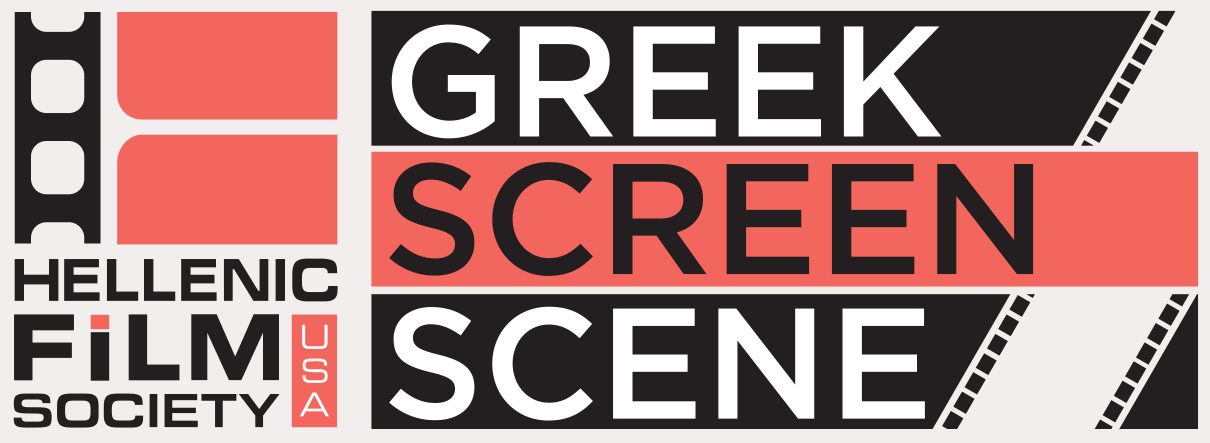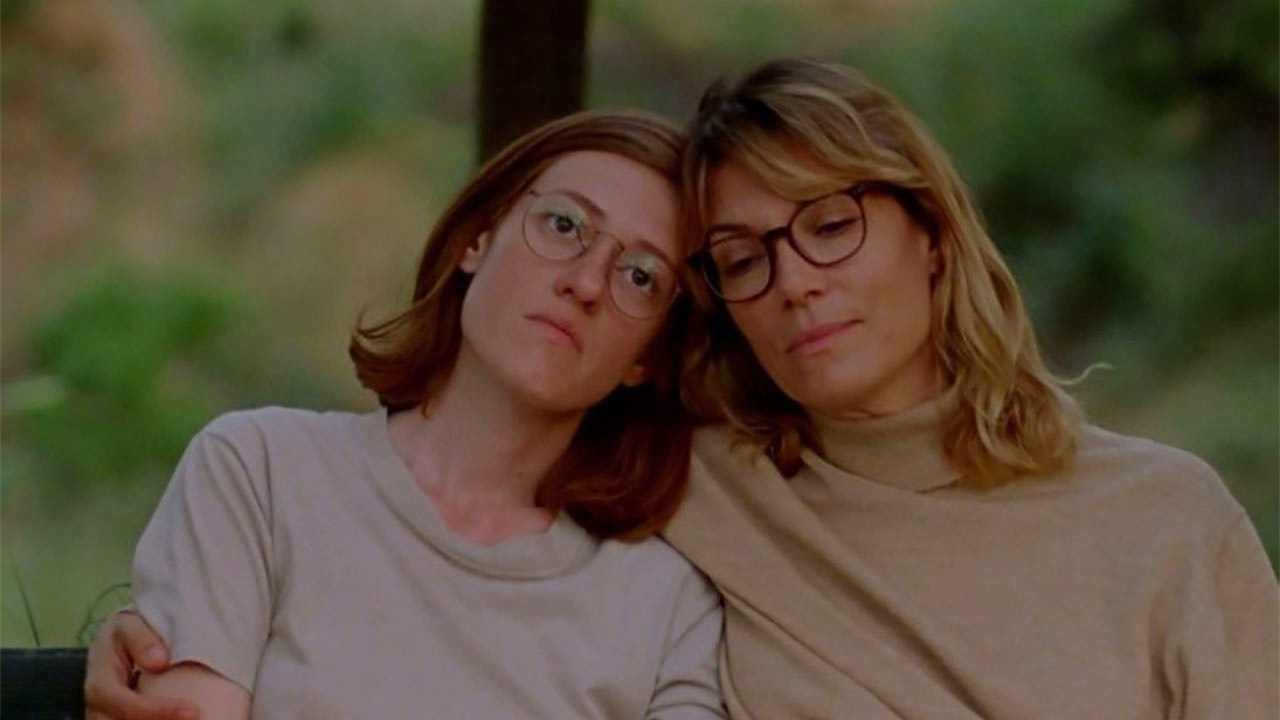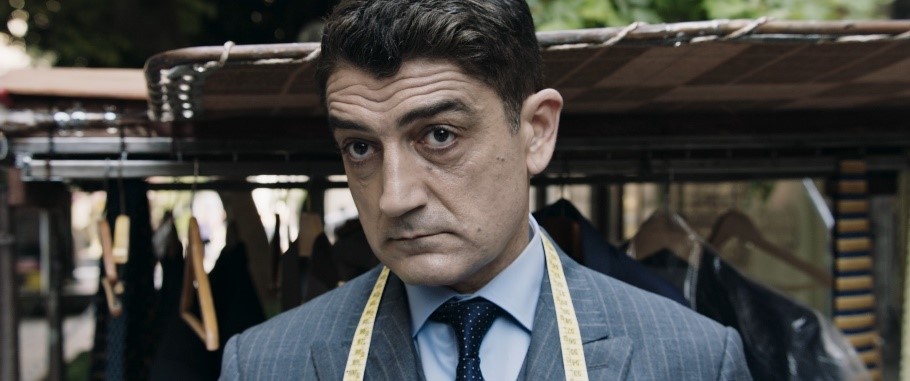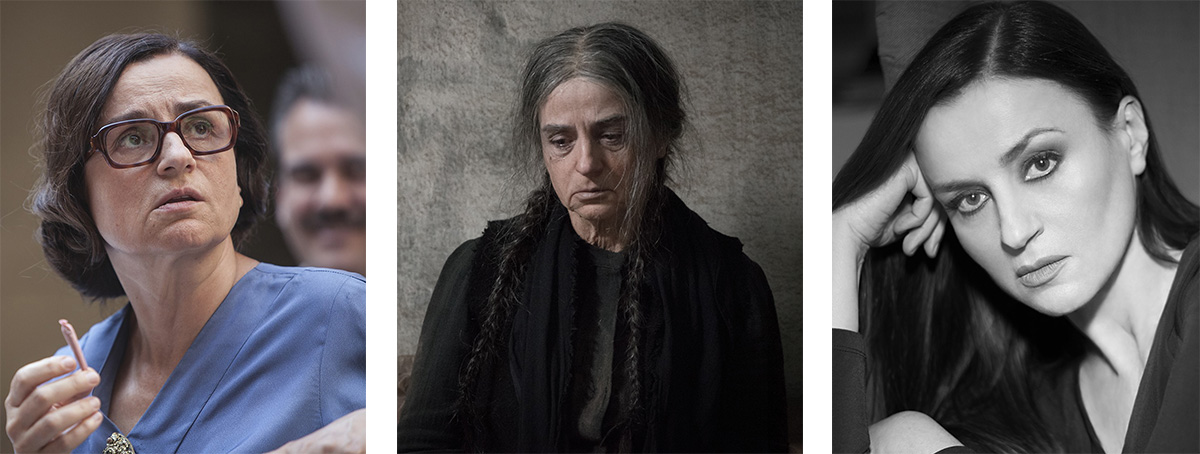MARCH 2024

HELLENIC FILM SOCIETY PRESENTS US PREMIERE OF POLYDROSO
SUNDAY MARCH 10 AT MUSEUM OF THE MOVING IMAGE
HELLENIC FILM SOCIETY PRESENTS US PREMIERE OF POLYDROSO
SUNDAY MARCH 10 AT MUSEUM OF THE MOVING IMAGE

With his unique directorial approach, Voulgaris uses humor, lyricism and honesty to tell the story of a woman (Sophia Kokkali) who returns to Polydroso, the Athens suburb where she was raised, to care for her ailing mother (Vicky Kaya). The ties between mother and daughter grow stronger as they relive past experiences and confront old ghosts that surround them. It’s rare for a male director to so adroitly capture the intimacy and passion of a female relationship, yet Voulgaris does not admit to understanding women better than most men do. “I do what I want to do without overthinking it,” he told the Hellenic Film Society in an exclusive interview. “I grew up with women in my family and many woman friends. I was always around women. But to be truthful, how I choose the stories I tell has a lot to do with the people I want to work with. For some reason, I prefer to work with actresses.”
For information about and tickets to the screening, visit www.hellenicfilmusa.org
Watch an interview with Alexandros Voulgaris (The Boy) on the HFS YouTube channel.

HELLENIC FILM SOCIETY PRESENTS US PREMIERE OF POLYDROSO
SUNDAY MARCH 10 AT MUSEUM OF THE MOVING IMAGE
HELLENIC FILM SOCIETY PRESENTS US PREMIERE OF POLYDROSO
SUNDAY MARCH 10 AT MUSEUM OF THE MOVING IMAGE
With his unique directorial approach, Voulgaris uses humor, lyricism and honesty to tell the story of a woman (Sophia Kokkali) who returns to Polydroso, the Athens suburb where she was raised, to care for her ailing mother (Vicky Kaya). The ties between mother and daughter grow stronger as they relive past experiences and confront old ghosts that surround them. It’s rare for a male director to so adroitly capture the intimacy and passion of a female relationship, yet Voulgaris does not admit to understanding women better than most men do. “I do what I want to do without overthinking it,” he told the Hellenic Film Society in an exclusive interview. “I grew up with women in my family and many woman friends. I was always around women. But to be truthful, how I choose the stories I tell has a lot to do with the people I want to work with. For some reason, I prefer to work with actresses.”
For information about and tickets to the screening, visit www.hellenicfilmusa.org
Watch an interview with Alexandros Voulgaris (The Boy) on the HFS YouTube channel.

TAILOR WILL BE SCREENED
AT NIARCHOS FOUNDATION LIBRARY IN NYC
TAILOR WILL BE SCREENED
AT NIARCHOS FOUNDATION LIBRARY IN NYC
The film is the story of a master tailor of men’s clothing (Dimitris Imellos) who is forced out of business by changing fashions. Needing to reinvent himself, he finds success sewing wedding gowns for the brides of Athens.
While admission to the screening is free, pre-registration is necessary. For more information, click here.Director Sonia Liza Kenterman will attend the screening and participate in a Q&A with the audience.

TAILOR WILL BE SCREENED
AT NIARCHOS FOUNDATION LIBRARY IN NYC
TAILOR WILL BE SCREENED
AT NIARCHOS FOUNDATION LIBRARY IN NYC
The film is the story of a master tailor of men’s clothing (Dimitris Imellos) who is forced out of business by changing fashions. Needing to reinvent himself, he finds success sewing wedding gowns for the brides of Athens.
While admission to the screening is free, pre-registration is necessary. For more information, click here.
Director Sonia Liza Kenterman will attend the screening and participate in a Q&A with the audience.
TWO HIT FILMS
BRING NEW FAME
TO LEAD ACTRESS
KARYOFYLLIA KARABETI
TWO HIT FILMS
BRING NEW FAME
TO LEAD ACTRESS
KARYOFYLLIA KARABETI

After a long, distinguished career in theater, film and television, Karyofyllia Karabeti finds herself at the height of her popularity, having starred in two of the most commercially successful Greek films of recent years.
In 2019, she appeared as the older beloved lyricist Eftyhia Papagiannopoulou in the biographical drama, My Name Is Eftyhia. This year she plays the title character in the screen adaptation of the Alexandros Papadiamantis novella Murderess. Both films broke box office records in their initial runs.
How does Karabeti pick her roles? “I always look for parts that have something to say to the audience,” she told the Hellenic Film Society. “A good social purpose makes a role worthy to work on. I don’t really mind if the part is small. So long as it has something to say, it’s okay with me. I also look at the people with whom I will be working. It doesn’t make sense if you have a good story but the people are not feeling good about working on it.”
Watch an interview with the three key women of Murderess on the Hellenic Film Society YouTube channel: lead actress Karyofyllia Karabeti, director Eva Nathena, and screenwriter Katerina Bey.
TWO HIT FILMS
BRING NEW FAME
TO LEAD ACTRESS
KARYOFYLLIA KARABETI
TWO HIT FILMS
BRING NEW FAME
TO LEAD ACTRESS
KARYOFYLLIA KARABETI

After a long, distinguished career in theater, film and television, Karyofyllia Karabeti finds herself at the height of her popularity, having starred in two of the most commercially successful Greek films of recent years.
In 2019, she appeared as the older beloved lyricist Eftyhia Papagiannopoulou in the biographical drama, My Name Is Eftyhia. This year she plays the title character in the screen adaptation of the Alexandros Papadiamantis novella Murderess. Both films broke box office records in their initial runs.
How does Karabeti pick her roles? “I always look for parts that have something to say to the audience,” she told the Hellenic Film Society. “A good social purpose makes a role worthy to work on. I don’t really mind if the part is small. So long as it has something to say, it’s okay with me. I also look at the people with whom I will be working. It doesn’t make sense if you have a good story but the people are not feeling good about working on it.”
Watch an interview with the three key women of Murderess on the Hellenic Film Society YouTube channel: lead actress Karyofyllia Karabeti, director Eva Nathena, and screenwriter Katerina Bey.

THESSALONIKI DOCUMENTARY FESTIVAL
MARCH 7-24
MARCH 7-24
SAME-SEX MARRIAGE DOCUMENTARY IS REDISCOVERED
SAME-SEX MARRIAGE DOCUMENTARY IS REDISCOVERED
 The recent legalization of same-sex marriage in Greece has brought attention to a film shown in the Thessaloniki Documentary Festival in 2022 but which has been little seen, at least until now.
The recent legalization of same-sex marriage in Greece has brought attention to a film shown in the Thessaloniki Documentary Festival in 2022 but which has been little seen, at least until now.Directed by filmmaker and activist Panagiotis Evangelidis, Tilos Weddings (Οι Γάμοι της Τήλου) focuses on the first gay and lesbian marriages performed in Greece and the impact they had on the Greek LGBTQ+ movement. In 2008, a time Evangelidis describes as a “heroic period” in the struggle for gay rights in Greece, Tassos Aliferis, mayor on the island of Tilos, agreed to preside over the marriage of a gay and a lesbian couple. Evangelides and his crew were there to record the ceremonies and to follow the two couples over a 48-hour period.
Not surprisingly, the Greek Orthodox Church and conservatives across the country were outraged. The marriages were annulled a year later, a decision eventually upheld by the Greek Supreme Court in 2017. Nevertheless, as the film shows, the marriages were a historic step forward for Greece’s gay community.
The 26th Thessaloniki International Documentary Film Festival this month will host a special tribute to Evangelidis’s “fearless and pioneering cinema.” He will be awarded an honorary Golden Alexander award for his “contribution to cinema and culture.”
SAME-SEX MARRIAGE DOCUMENTARY IS REDISCOVERED
SAME-SEX MARRIAGE DOCUMENTARY IS REDISCOVERED
 The recent legalization of same-sex marriage in Greece has brought attention to a film shown in the Thessaloniki Documentary Festival in 2022 but which has been little seen, at least until now.
The recent legalization of same-sex marriage in Greece has brought attention to a film shown in the Thessaloniki Documentary Festival in 2022 but which has been little seen, at least until now.Directed by filmmaker and activist Panagiotis Evangelidis, Tilos Weddings (Οι Γάμοι της Τήλου) focuses on the first gay and lesbian marriages performed in Greece and the impact they had on the Greek LGBTQ+ movement. In 2008, a time Evangelidis describes as a “heroic period” in the struggle for gay rights in Greece, Tassos Aliferis, mayor on the island of Tilos, agreed to preside over the marriage of a gay and a lesbian couple. Evangelides and his crew were there to record the ceremonies and to follow the two couples over a 48-hour period.
Not surprisingly, the Greek Orthodox Church and conservatives across the country were outraged. The marriages were annulled a year later, a decision eventually upheld by the Greek Supreme Court in 2017. Nevertheless, as the film shows, the marriages were a historic step forward for Greece’s gay community.
The 26th Thessaloniki International Documentary Film Festival this month will host a special tribute to Evangelidis’s “fearless and pioneering cinema.” He will be awarded an honorary Golden Alexander award for his “contribution to cinema and culture.”
SAME-SEX MARRIAGE DOCUMENTARY IS REDISCOVERED
SAME-SEX MARRIAGE DOCUMENTARY IS REDISCOVERED
 The recent legalization of same-sex marriage in Greece has brought attention to a film shown in the Thessaloniki Documentary Festival in 2022 but which has been little seen, at least until now.
The recent legalization of same-sex marriage in Greece has brought attention to a film shown in the Thessaloniki Documentary Festival in 2022 but which has been little seen, at least until now.Directed by filmmaker and activist Panagiotis Evangelidis, Tilos Weddings (Οι Γάμοι της Τήλου) focuses on the first gay and lesbian marriages performed in Greece and the impact they had on the Greek LGBTQ+ movement. In 2008, a time Evangelidis describes as a “heroic period” in the struggle for gay rights in Greece, Tassos Aliferis, mayor on the island of Tilos, agreed to preside over the marriage of a gay and a lesbian couple. Evangelides and his crew were there to record the ceremonies and to follow the two couples over a 48-hour period.
Not surprisingly, the Greek Orthodox Church and conservatives across the country were outraged. The marriages were annulled a year later, a decision eventually upheld by the Greek Supreme Court in 2017. Nevertheless, as the film shows, the marriages were a historic step forward for Greece’s gay community.
The 26th Thessaloniki International Documentary Film Festival this month will host a special tribute to Evangelidis’s “fearless and pioneering cinema.” He will be awarded an honorary Golden Alexander award for his “contribution to cinema and culture.”
ARCADIA DEBUTS AT BERLINALE 2024
ARCADIA DEBUTS AT BERLINALE 2024
 Arcadia, the much-awaited second feature film by director Yorgos Zois, made its debut at a sold-out screening at the Berlin Film Festival last month. Early reviews have been positive, presaging a successful run on the worldwide art house circuit.
Arcadia, the much-awaited second feature film by director Yorgos Zois, made its debut at a sold-out screening at the Berlin Film Festival last month. Early reviews have been positive, presaging a successful run on the worldwide art house circuit.Screen Daily called the film “an intriguing metaphysical fantasy…an eerie enigma of a film that reveals its secrets with a satisfying slow build.”
The film opens with a somber drive to an off-season seaside resort where a neurologist (Angeliki Papoulia) and her husband (Vangelis Mourikis), a once-esteemed doctor, have been summoned to identify the victim of a car accident. The grim process becomes the catalyst for the uncovering of difficult truths.
“One feels immersed in a bizarre world of coded events and dialogues,” Cineuropa claimed, “the challenging interpretation of which creates the urge to keep following the increasingly uncanny plot that unfolds.”
Variety called Arcadia “a tale of love, loss, acceptance and letting go… a genre-bending attempt to push—and blur—boundaries.”
ARCADIA DEBUTS AT BERLINALE 2024
ARCADIA DEBUTS AT BERLINALE 2024
 Arcadia, the much-awaited second feature film by director Yorgos Zois, made its debut at a sold-out screening at the Berlin Film Festival last month. Early reviews have been positive, presaging a successful run on the worldwide art house circuit.
Arcadia, the much-awaited second feature film by director Yorgos Zois, made its debut at a sold-out screening at the Berlin Film Festival last month. Early reviews have been positive, presaging a successful run on the worldwide art house circuit.Screen Daily called the film “an intriguing metaphysical fantasy…an eerie enigma of a film that reveals its secrets with a satisfying slow build.”
The film opens with a somber drive to an off-season seaside resort where a neurologist (Angeliki Papoulia) and her husband (Vangelis Mourikis), a once-esteemed doctor, have been summoned to identify the victim of a car accident. The grim process becomes the catalyst for the uncovering of difficult truths.
“One feels immersed in a bizarre world of coded events and dialogues,” Cineuropa claimed, “the challenging interpretation of which creates the urge to keep following the increasingly uncanny plot that unfolds.”
Variety called Arcadia “a tale of love, loss, acceptance and letting go… a genre-bending attempt to push—and blur—boundaries.”
ARCADIA DEBUTS AT BERLINALE 2024
ARCADIA DEBUTS AT BERLINALE 2024
 Arcadia, the much-awaited second feature film by director Yorgos Zois, made its debut at a sold-out screening at the Berlin Film Festival last month. Early reviews have been positive, presaging a successful run on the worldwide art house circuit.
Arcadia, the much-awaited second feature film by director Yorgos Zois, made its debut at a sold-out screening at the Berlin Film Festival last month. Early reviews have been positive, presaging a successful run on the worldwide art house circuit.Screen Daily called the film “an intriguing metaphysical fantasy…an eerie enigma of a film that reveals its secrets with a satisfying slow build.”
The film opens with a somber drive to an off-season seaside resort where a neurologist (Angeliki Papoulia) and her husband (Vangelis Mourikis), a once-esteemed doctor, have been summoned to identify the victim of a car accident. The grim process becomes the catalyst for the uncovering of difficult truths.
“One feels immersed in a bizarre world of coded events and dialogues,” Cineuropa claimed, “the challenging interpretation of which creates the urge to keep following the increasingly uncanny plot that unfolds.”
Variety called Arcadia “a tale of love, loss, acceptance and letting go… a genre-bending attempt to push—and blur—boundaries.”
ANGRY PENELOPE
ANGRY PENELOPE
 In The Return, an upcoming film adaptation of The Odyssey directed by Uberto Pasolini, Juliette Binoche plays Penelope opposite Ralph Fiennes’s Ulysses. Binoche told The New York Times, “In this Penelope there’s an anger that has been building for years of being left alone, of having to deal with those suitors, of seeing her son in a fragile position. There’s patience, but there are also a lot of upset feelings. I find it interesting to play that because some people portray her as a saint. We didn’t. The director told me that he really wanted a woman who’s like the feminine perspective on male testosterone wars and men’s need to go away…I think it’s a very modern film in that way.”
In The Return, an upcoming film adaptation of The Odyssey directed by Uberto Pasolini, Juliette Binoche plays Penelope opposite Ralph Fiennes’s Ulysses. Binoche told The New York Times, “In this Penelope there’s an anger that has been building for years of being left alone, of having to deal with those suitors, of seeing her son in a fragile position. There’s patience, but there are also a lot of upset feelings. I find it interesting to play that because some people portray her as a saint. We didn’t. The director told me that he really wanted a woman who’s like the feminine perspective on male testosterone wars and men’s need to go away…I think it’s a very modern film in that way.”ANGRY PENELOPE
ANGRY PENELOPE
 In The Return, an upcoming film adaptation of The Odyssey directed by Uberto Pasolini, Juliette Binoche plays Penelope opposite Ralph Fiennes’s Ulysses. Binoche told The New York Times, “In this Penelope there’s an anger that has been building for years of being left alone, of having to deal with those suitors, of seeing her son in a fragile position. There’s patience, but there are also a lot of upset feelings. I find it interesting to play that because some people portray her as a saint. We didn’t. The director told me that he really wanted a woman who’s like the feminine perspective on male testosterone wars and men’s need to go away…I think it’s a very modern film in that way.”
In The Return, an upcoming film adaptation of The Odyssey directed by Uberto Pasolini, Juliette Binoche plays Penelope opposite Ralph Fiennes’s Ulysses. Binoche told The New York Times, “In this Penelope there’s an anger that has been building for years of being left alone, of having to deal with those suitors, of seeing her son in a fragile position. There’s patience, but there are also a lot of upset feelings. I find it interesting to play that because some people portray her as a saint. We didn’t. The director told me that he really wanted a woman who’s like the feminine perspective on male testosterone wars and men’s need to go away…I think it’s a very modern film in that way.”ANGRY PENELOPE
ANGRY PENELOPE
 In The Return, an upcoming film adaptation of The Odyssey directed by Uberto Pasolini, Juliette Binoche plays Penelope opposite Ralph Fiennes’s Ulysses. Binoche told The New York Times, “In this Penelope there’s an anger that has been building for years of being left alone, of having to deal with those suitors, of seeing her son in a fragile position. There’s patience, but there are also a lot of upset feelings. I find it interesting to play that because some people portray her as a saint. We didn’t. The director told me that he really wanted a woman who’s like the feminine perspective on male testosterone wars and men’s need to go away…I think it’s a very modern film in that way.”
In The Return, an upcoming film adaptation of The Odyssey directed by Uberto Pasolini, Juliette Binoche plays Penelope opposite Ralph Fiennes’s Ulysses. Binoche told The New York Times, “In this Penelope there’s an anger that has been building for years of being left alone, of having to deal with those suitors, of seeing her son in a fragile position. There’s patience, but there are also a lot of upset feelings. I find it interesting to play that because some people portray her as a saint. We didn’t. The director told me that he really wanted a woman who’s like the feminine perspective on male testosterone wars and men’s need to go away…I think it’s a very modern film in that way.”OSCAR TRIVIA
Tennessee-born Hermes Pan (Panagiotopoulos) was the first Greek American to win an Oscar. Best remembered as Fred Astaire’s choreographer, Pan won the Best Dance Direction Oscar in 1937 for Damsel in Distress.
Greek-born Katina Paxinou won the Best Supporting Actress Oscar in 1944 for her portrayal of Pilar in For Whom the Bell Tolls. She was the first “foreigner” to win an Oscar.
Melina Mercouri was nominated for Best Actress in 1960 for Never on Sunday, but the Oscar went to Simone Signoret for Room At The Top.
Olympia Dukakis won the Oscar for Best Supporting Actress in 1988 for Moonstruck.
Greek American George Chakiris won the Oscar for Best Supporting Actor in 1961 for West Side Story.
Over the years, five Greek-language films have been nominated for the Best International Film Oscar: Electra (1962), directed by Michael Cacoyannis; The Red Lanterns (1963) and Blood on the Land (1966), both directed by Vasilis Georgiadis; Iphigenia (1977), Michael Cacoyannis; and Dogtooth (2009), Yorgos Lanthimos. None has won.
Greek-American producer Anthony Katagas picked up the Best Picture Oscar in 2013 for 12 Years A Slave.
The 2009 Best Documentary Oscar went to Louie Psihoyos for The Cove.
In 1961, Manos Hadjidakis won an Oscar for his song, Never on Sunday. Vangelis Papathanassiou’s score for Chariots of Fire won in 1982.

Please consider a giſt to the Hellenic Film Society so we can continue to present Greek films that entertain, inform, and inspire.
Or checks may be made payable to: Hellenic Film Society USA, Inc.,
can be sent to: Hellenic Film Society USA, 35-07 Broadway, Astoria, NY 11106
All donations are tax deductible. Thank you for your consideration
Our free YouTube channel has 1.8+ Million views!
to see Greek films and interviews with filmmakers
AND PLEASE FORWARD THIS EMAIL
TELL ALL YOUR FRIENDS!
Do you enjoy our updates? Please forward to someone else interested in Greek film.
If this email was forwarded to you, click here to subscribe.


The Hellenic Film Society USA is a 501(c)(3) non-profit organization rooted in the belief that Greek cinema deserves to be part of
the American cultural landscape. We promote feature films, documentaries, and film shorts made by Greek filmmakers and those
of Greek descent, as well as films that promote the cultures of Greece and Cyprus.
For further information or to learn how to partner with us, please visit hellenicfilmusa.org or call 347-934-9497. We invite you to
sign up for our mailing list and follow us on Facebook and Instagram.
Copyright © 2024 Hellenic Film Society USA. All rights reserved.




 Before Getting Started
Before Getting Started FREQUENTLY ASKED QUESTIONS
FREQUENTLY ASKED QUESTIONS